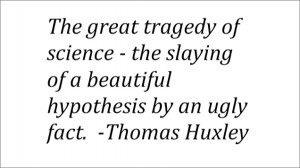The Keys to a Great Hypothesis
by
 A great hypothesis is the foundation upon which great experiments may be designed and carried out. Hypotheses ultimately help us to make sense of the experimental data we observe. Non-hypothesis-driven research, we are often told, is a reckless fishing expedition that relies on luck and is not how research should be performed. Interestingly, the opposite of this criticism is the biggest danger of working with a hypothesis.
A great hypothesis is the foundation upon which great experiments may be designed and carried out. Hypotheses ultimately help us to make sense of the experimental data we observe. Non-hypothesis-driven research, we are often told, is a reckless fishing expedition that relies on luck and is not how research should be performed. Interestingly, the opposite of this criticism is the biggest danger of working with a hypothesis.
Here’s what several of the greatest scientific and philosophic minds in recent history had to say about the research process.
“The fewer the facts, the stronger the opinion.” -Arnold H. Glasow
“The most exciting phrase to hear in science, the one that heralds new discoveries, is not ‘Eureka!’ but ‘That’s funny…'” -Isaac Asimov
“The great tragedy of science – the slaying of a beautiful hypothesis by an ugly fact.” -Thomas Huxley
“There is one thing even more vital to science than intelligent methods; and that is, the sincere desire to find out the truth, whatever it may be.” -Charles Pierce
Taken together, a very clear picture emerges of how hypotheses should be used in research. The single most important aspect when working with hypotheses is to remain open-minded. Look out for the “That’s funny” moments, as they often disguise themselves as “It didn’t work” moments when the blinders are on too tightly. We should be constantly evolving and updating our hypotheses according to our results.
While the scientific minds above provide advice that may seem obvious, in practice, this can be more difficult than it seems. Working off a model is easy – even fun – particularly when the model describes an incredibly exciting finding. However, when data start diverging from the expected results, there may be a temptation to declare the experiment a failure that instead requires more troubleshooting. As a result, the project grinds to a halt.
Why would anyone ever ignore the data that’s right in front of them? Several factors may contribute to our impaired judgment.
Time
Like some bastardized version of the Stockholm Syndrome, we need a term for the process of warming up to a hypothesis over time, to the point where we accept it as truth… with no supporting data. The longer we work on a project, the more difficult it can be to look objectively at a situation. It’s much easier to completely rework a hypothesis three months after starting a project as opposed to three years.
Money
Grants are written based on preliminary experiments and solid hypotheses. Experiments are outlined and results are projected. They tell a beautiful story of an exciting scientific discovery that, if not exciting, wouldn’t be funded. Therefore, when results come back that suggest the project isn’t unfolding as predicted, the immediate reaction can be that the experiments aren’t working and more troubleshooting is required. If that one experiment would just work, the whole thing would come together and it would certainly be a Science paper…likely the cover. And that would look really good in the competitive renewal…
Payoff
Naturally, we expect a payoff after working on a project. The more time and money we spend on a project the more significant of a payoff we may demand in order to justify the costs. The possibility of an exciting, high-profile story based on our hypothesis only becomes more attractive with time.
Courage
We may have data that supports more than 50% of the hypothesis. We’ve probably given talks on it, written grants on it and boasted to our colleagues about it. Admitting we were wrong and that we may need to open up and consider other options is not always easy, but it’s right.
As Charles Pierce said, if the point of science is “to find out the truth, whatever it may be”, we must be willing to follow the data, wherever they may take us.
Ever seen a colleague refuse to let go of a hypothesis, despite data suggesting they should?


Cynthia Manley
wrote on September 30, 2009 at 1:15 pm
I recently used the following to explain a "failure" in a marketing project that did not have the return we had hoped for: "We were successful at proving our hypothesis wrong." The chief marketing officer didn't really buy it. But it made ME feel better.
alan@benchfly
wrote on September 30, 2009 at 1:31 pm
Hahaha! Well, I've used that line more times than I care to remember… It's rarely welcomed with an excited response…
13columns
wrote on September 30, 2009 at 11:25 pm
a new postdoc in the lab has basically been troubleshooting the same three reactions for more than six months now. pretty sure it's not his hands at this point…
PlayLady
wrote on October 2, 2009 at 3:28 am
This loosely reminds me of those Choose Your Own Adventure books, in which I always fell into a mass of quick sand, or the mouth of a beastly creature. Perhaps I should fail to list those options as potential outcomes when pitching my next grant?